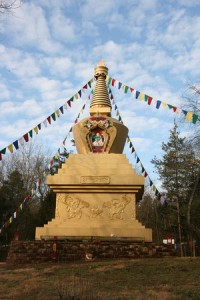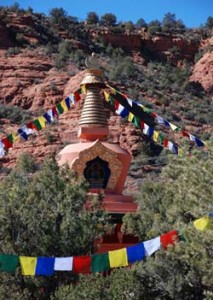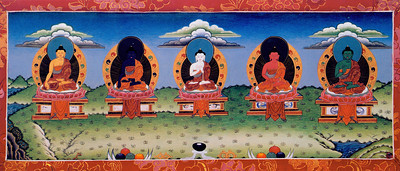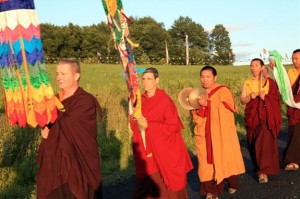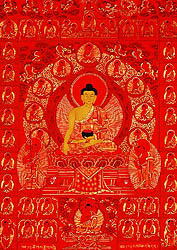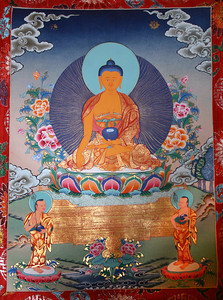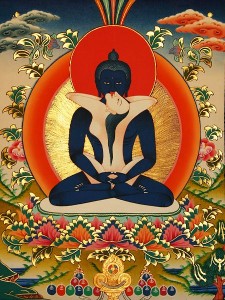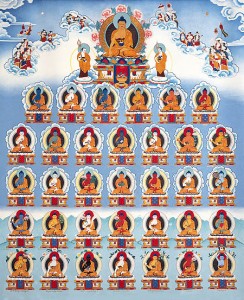
JI NYED SU DAG CHOG CHU’I JIG TEN NA
However many Buddhas there are in the Ten Directions of the Universe,
DÜ SUM SHEG PA MI YI SENGE KÜN
All the Tathagatas of the Three Times, Lions among men,
DAG GI MA LÜ DE DAG THAM CHED LA
To all of them without exception
LÜ DANG NGAG YID DANG WE CHAG GYI-O
I pay homage with body, speech and mind.
ZANG PO JÖD PA’I MÖN LAM TOB DAG GI
Through the strength of this prayer for excellent conduct, which I make,
GYAL WA THAM CHED YID KYI NGÖN SUM DU
By directly perceiving all Buddhas within my mind,
ZHING GI DÜL NYED LÜ RAB TÜD PA YI
By prostrating, with bodies as numerous as the atoms in the Universe,
GYAL WA KÜN LA RAB TU CHAG TSAL LO
I bow down to all the Conquerors.
DÜL CHIG TENG NA DÜL NYED SANGYE NAM
Upon each atom are as many Buddhas as there are atoms,
SANGYE SE KYI Ü NA SHUG PA DANG
And they reside amidst the Buddha’s sons.
DE TAR CHÖ KYI YING NAM MA LÜ PA
Therefore, all the Dharmadhatu without exception
THAM CHED GYAL WA DAG GI GANG WAR MÖ
I fervently regard as filled with precious Buddhas.
DE DAG NGAG PA MI ZED GYATSHO NAM
(I) praise all of them as an exhaustless ocean.
YANG KYI YEN LAG GYATSHO’I DRA KÜN GYI
In addition, all sounds of this praise (are) as a melodious ocean,
GYAL WA KÜN GYI YÖN TEN RAB DZÖD CHING
Expressing the qualities of all the Buddhas,
DE WAR SHEG PA THAM CHED DAG GI TÖD
I praise all of the Tathagatas!
ME TOG DAM PA TRENG WA DAM PA DANG
Sacred flowers, sacred garlands and
SIL NYEN NAM DANG JUG PA DUG CHOG DANG
All musical instruments, perfumes, the supreme parasol,
MAR ME CHOG DANG DUG PÖ DAM PA YI
Superior lamps and superior incense
GYAL WA DE DAG LA NI CHÖD PAR GYI
I offer to the Buddhas.
NA ZA DAM PA NAM DANG DRI CHOG DANG
All sacred garments and supreme fragrances, and
CHE MA PHUR MA RI RAB NYAM PA DANG
Piled barley meal equal to Mt. Meru, and
KÖD PA KHYED PAR PHAG PA’I CHOG KÜN GYI
All specifically exalted, supreme and perfectly arranged offerings,
GYAL WA DE DAG LA NI CHÖD PAR GYI
I offer forth to the Buddhas.
CHÖD PA GANG NAM LA MED GYA CHE WA
All offerings, unsurpassed and extremely vast,
DE DAG GYAL WA THAM CHED LA YANG MÖ
(I offer) with fervent regard to all the Buddhas.
ZANG PO CHÖD LA DED PA’I TOB DAG GI
Through the strength of faith in this prayer for excellent conduct,
GYAL WA KÜN LA CHAG TSAL CHÖD PAR GYI
I prostrate and make offerings to all the Conquerors.
DÖD CHAG ZHE DANG TI MUG WANG GI NI
Under the power of desire, hatred and delusion,
LÜ DANG NGAG DANG DE ZHIN YID KYI KYANG
Through body, speech and likewise mind,
DIG PA DAG GI GYI PA CHI CHI PA
Whatever negativity I have accrued,
DE DAG THAM CHED DAG GI SO SOR SHAG
All of it I individually confess.
CHOG CHU’I GYAL WA KÜN DANG SANGYE SE
All the Conquerors of the Ten Directions and their Sons,
RANG GYAL NAM DANG LOB DANG MI LOB DANG
Pratyekabuddhas, those on the path of Training and no-more Training,
DRO WA KÜN GYI SÖD NAM GANG LA YANG
Whatever merit all sentient beings have,
DE DAG KÜN GYI JE SU DAG YI RANG
In all of this I rejoice!
GANG NAM CHOG CHU’I JIG TEN DRÖN MA NAM
Whosoever illuminates the Ten Directions of this world,
CHANG CHUB RIM PAR SANGYE MA CHAG NYE
Those who ascend the Stages of Bodhisattvahood without attachment to Buddhahood,
GÖN PO DE DAG DAG GI THAM CHED LA
All of those protectors,
KHOR LO LA NA MED PAR KOR WAR KUL
I entreat to turn the unsurpassed Dharma Wheel.
NYA NGEN DA TÖN GANG ZHED DE DAG LA
To whosoever can reveal the place beyond sorrow
DRO WA KÜN LA PHEN ZHING DE WA’I CHIR
For the purpose of bringing benefit and bliss to all sentient beings,
KALPA ZHING KI DÜL NYED ZHUG PAR YANG
I beg you to remain for as many æons as there are atoms.
DAG GI THAL MO RAB CHAR SÖL WAR GYI
I bring my palms together in prayer.
CHAG TSAL WA DANG CHÖD CHING SHAG PA DANG
By prostration, offering and confession,
JE SU YID RANG KÜL ZHING SÖL WA YI
Rejoicing, entreating and supplicating,
GE WA CHUNG ZED DAG GI CHI SAG PA
Whatever little merit I have managed to accumulate
THAM CHED DAG GI CHANG CHUB CHIR NGO WO
I dedicate for the purpose of the Enlightenment of All!
